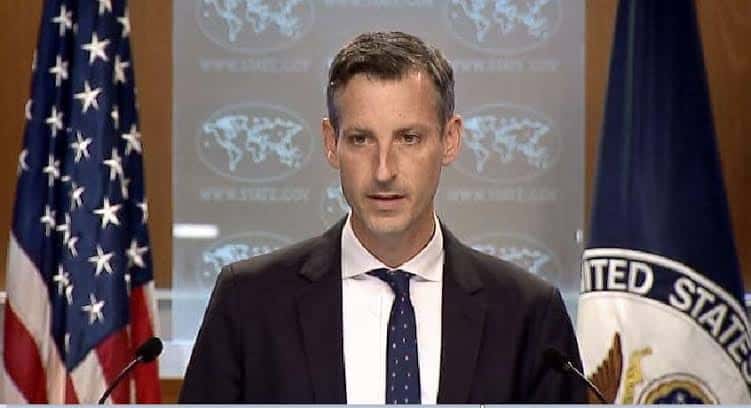The United States said on Wednesday that Greek sovereignty over two islands was not in doubt after Ankara protested the deployment of US armoured vehicles.
Turkey on Monday summoned the Greek ambassador and complained to the United States after releasing aerial images that it said showed ships with the US armoured vehicles docking in Lesbos and Samos.
“Greek's sovereignty over these islands is not in question,” State Department spokesman Ned Price told reporters.
“We urge all the parties to avoid rhetoric and taking actions that could further exacerbate tensions. The sovereignty the territorial integrity of all countries should be respected,” Price said.
Department Press Briefing – September 28, 2022
QUESTION: Separate topic. Turkey has issued a diplomatic protest to the United States and Greece for deploying U.S.-provided armoured vehicles to the Aegean Islands of non-military status under existing agreements. Have you provided an official response to Turkey?
MR PRICE: Look, we would refer you to specific governments regarding any deployment of their own defense equipment. That is not something for us to speak to. More broadly, and I believe I said this the other day, we continue to encourage our NATO Allies – Turkey and Greece, in this case – to work together to maintain peace and security in the region and to resolve their differences diplomatically. We urge all the parties to avoid rhetoric and to avoid taking actions that could further exacerbate tensions. The sovereignty, the territorial integrity of all countries should be respected. Greece’s sovereignty over these islands is not in question, but we call on all countries, including our allies, to respect territorial integrity and sovereignty, and to avoid actions that could inflame tensions.
QUESTION: We just – moments ago we talked about Ukraine and the provisions under arms provided to Ukraine. Now, I know that all defense articles of the United States are provided on certain provisions. Aren’t there any provisions on those equipment provided to Greece in – being used in violation of international agreements, as Turkish Government deems it?
MR PRICE: We are always taking a close look at the security assistance, including potential weapon systems and supplies, that we’re providing to allies and partners around the world. We are in a fortunate position to have a number of close security partners around the world, people – countries that look to the United States as a supplier for the security that they need to confront what are often shared challenges and shared threats. Oftentimes this will come in the form of terrorism threats and other collective challenges, but there is a constant evaluative process when it comes to looking at the security assistance we provide to any country around the world.
QUESTION: Does that apply to Turkey and the S-400s as well, when you talk about how it’s up to each country to oversee or to determine the deployment of their own defense equipment?
MR PRICE: Of course it is. And their – and —
QUESTION: It is. Okay, well then, why are you telling the Turks constantly not to deploy this and not to buy it in the first place, but —
MR PRICE: And we have also made clear that there will be implications given certain choices.
QUESTION: Then I think, then, the logical next question is if – and we’re talking about U.S.-supplied military here in Greece, right? Are there not any implications?
MR PRICE: Matt, I don’t think our – this ally is interested in purchasing the S-400 system in question here. This is the purchase of a particular Russian system that ran afoul of —
QUESTION: I know. It’s a question of consistency —
MR PRICE: — of congressionally mandated sanctions. So these are different cases. Of course, countries around the world are open to make their own choices. There will be cases – extreme cases – where certain choices will have implications on the part of the United States and our bilateral relationship.
QUESTION: There are also – yeah, for example, F-16s. About – we talk about F-16s, and Congress is trying to bring some provisions that F-16s should not be used in kind of a violation of Greek airspace, something like this. The question is: If provision applies to one partner and not the other, what is the standard? How should we trace those provisions and see that, okay, here is the standard, and here is double standard?
MR PRICE: The standard we use is what is in America’s national interests, and it just so happens that when it comes to our allies and partners, what tends to be in our national interest is in the collective interest as well.
Yes.
QUESTION: Is it in the national interest of the United States —
MR PRICE: Let me move around, so yes.
QUESTION: Turkey uses its drone technology to spy illegally on the Greek islands, and also, as a matter of fact, they don’t even try to hide it; they release themselves the picture. So my question is: What is your reactions to this incident? And second, is it unacceptable for a NATO Ally to spy on another NATO Ally?
MR PRICE: As I said in response to your colleague’s question, we encourage countries around the world, particularly our NATO Allies, particularly as we are facing a collective threat from the Russian Federation – not only what it’s doing in Ukraine but the threat it poses to the broader region – to remain focused, to remain focused on the threats that are a challenge to all of us. And in so doing, we encourage all of our NATO Allies to work together to resolve any differences through dialogue and diplomacy.
Yes.


